Monthly Main Meeting Highlights
March 2010
Software, Gadgets and Good Advice
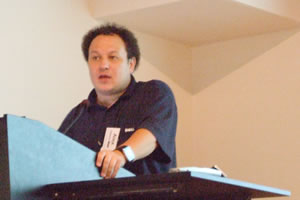
Tonight Alex was along to present a very eclectic range of interesting
matters including the trial version of Microsoft Office 2010, software to
give us back the classic Office Menus and Diskeeper disk optimising technology.
We started with a lively Q and A session, which included a discussion of
various email problems. In answer Alex described the use of Gmail, that
is Google mail

and Hotmail the Microsoft alternative. Hotmail is now called Windows Live
mail and is part of Windows Live.
Alex has his e-mail re-directed to his G-Mail which enables him to track his mail anywhere. He suggested that one way to have permanent e-mail address was to buy a domain name account just for e-mail. Then it won’t matter if you change your service provider your e-mail address remains the same.
Several web hosting companies were suggested including GoDaddy, John Symonds
favourite, Jumba and WedCity, our own web host provider.
GoDaddy provides both cheap domain names and web hosting

as do Jumba
http://www.jumba.com.au/hosting/personal
and WebCity
you can find list of some of the other cheap web hosting companies here:

some of which offer free domain names for the life of your contract.
Please note we are not recommending any service, this is just a list of
those mentioned at the meeting.
Hardware
Next Alex talked us through three of his gadgets.
First was the Samsung portable hard drive
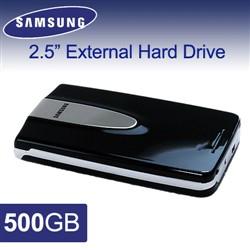
Alex pointed out just how cheap portable hard drives are becoming and the
huge increase in storage capacity. He recommended we buy two and back up
our backups.
He noted that the Samsung 320 GB version was $79 and the 500GB version was
$99 at TX Computing.
See the TX Computers latest PDF Price list at:
http://txcomputer.com.au/pricelists/parts.pdf
Next came, the Varta Solar Battery Charger.
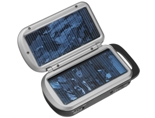
The charger comes with a USB adapter and various mobile phone connections.
It charges two AA batteries giving about two hours to a mobile phone.
See the press release
http://www.en.varta-consumer.com/content.php?path=/1241773616.html&&domain=www.en.varta-consumer.com
and the details
http://www.en.varta-consumer.com/content.php?path=/1247126994.html&&domain=www.en.varta-consumer.com
This was followed by the Netcom 3G Travel Router.
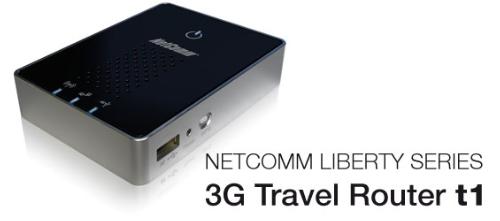
This portable modem allows you to connect your network to your portable wireless
provider using your USB wireless modem.
I can see a use for that if you have run out of bandwidth at home.
http://www.netcomm.com.au/netcomm-products/3g-mobile-broadband/3gt1wn
Alex also spoke of an even smaller router, into which you simply place the
modems’ SIM card.
Software
In software Alex demonstrated the new Office 2010.

Office 2010 now gives us an editable ribbon menu. You can download
a trial version which runs out in October.
He also compared Office to the online Office produces such as Google Office
and Windows Live. WIndows live only has document file shares at this point.
![]()
And for those of you who don’t like the un-editable Office 2007 ribbon there
is software that allows you to have the classic menus back.
http://www.addintools.com/english/menuoffice/
It’s from Add-In-tools. Here are the prices
https://www.regnow.com/softsell/nph-softsell.cgi?item=14174-4
In searching for this I also found some free classic menu add -ins for Office
2007
http://www.freewaregenius.com/2009/03/07/ubitmenu-use-the-office-2003-interface-in-office-2007/
and
http://www.freedownloadscenter.com/Business/MS_Office_Add-ins/Classic_Menu_for_Office_2007.html
The Raffle.
Alex provided heaps of goodies from Google to Intel.
Which including several “Blue Men” USB sticks from Intel.
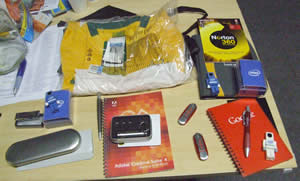
The main winners were
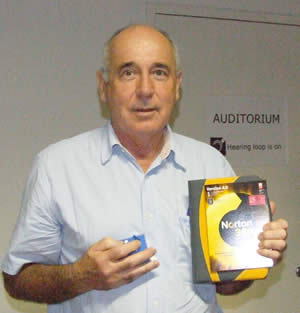
John Symonds,
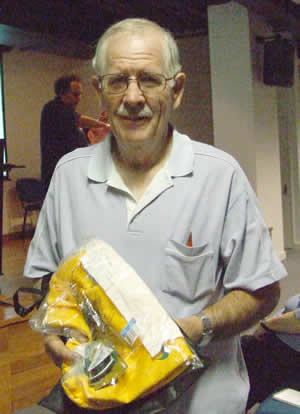
Brian Mcdonald,
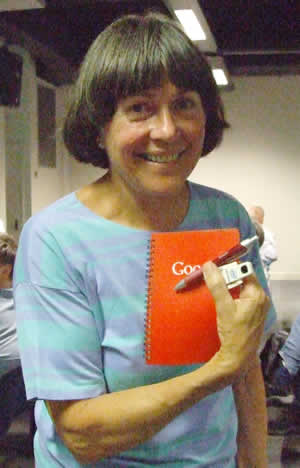
Clare Wagemans,
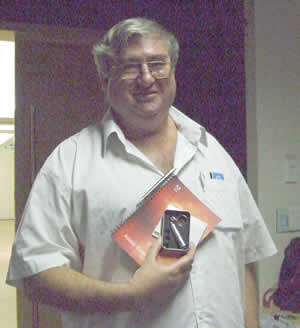
Peter Collard,
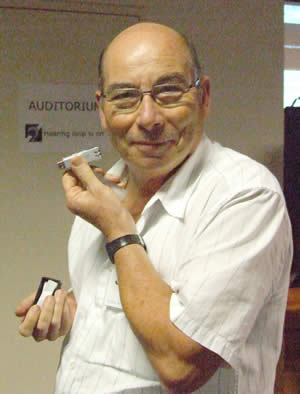
James Hill,
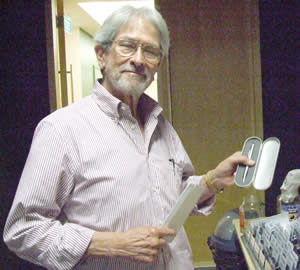
Warren Wylie
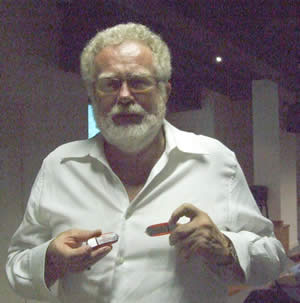
and John Cook
Diskeeper
Those of us able to stay after 8 got to see Diskeeper.
Diskeeper is a software utility for hard drives to help keep them at optimum
performance.
To quote
from their site
(It) Prevents most fragmentation before it is created and increases
system speed and efficiency for all home computers and laptops. Give your
home PC faster-than-new speed and reliability without any additional effort
on your part. Simply install Disk keeper 2010. That’s it!
Defragging Solid State Drives.
Now here’s something I was not aware of, you don’t defrag solid state drives
(SSD). My Dell Mini 9 has a 14 G SSD after a year if was full. Thinking
I was doing the right think I deleted all the temporary files and defragged
the disk. That may not be a good idea as,
A) It may not be necessary, and
B) it limits the life of the disk.
One other member defragged his daughters SSD and on reboot found he had
lost the drive.
Intel had this to say
Do I need to defragment my Intel® Mainstream Solid-State Drives (using Windows*
Disk Defragmenter* or similar program)?
No. SSD devices, unlike traditional HDDs, see no performance benefit from
traditional HDD defragmentation tools. Using these tools simply adds unnecessary
wear to the SSD. It is recommended that you disable any automatic or scheduled
defragmentation utilities for your Intel SSD. See below
http://www.intel.com/support/ssdc/hpssd/sb/CS-029623.htm#5
However Diskeeper appears to have a different view as seen in the following
video.
Mick Materte, Produce Manager from Diskeeper believe we should defrag using
the right technology see http://www.diskeeper.com/products/documentation/video-Diskeeper2.aspx
Disc keeper has the HyperFast SSD Optimiser which is designed to keep your
SDD working as optimum performance
See their page on Disk keeper HyperFast SSD Optimiser
http://www.diskeeper.com/hyperfast/
or the PDF on the technology
http://downloads.diskeeper.com/pdf/Optimizing-Solid-State-Storage-with-HyperFast-Technology.pdf
I think the question of defragging an SSD drive may be a good Q and A for next month.
That problem aside, Diskeeper works in the back ground to maintain your
hard drive in optimum performance. It is a real set and forget, program.
Diskeeper claims to eliminate up to 85% of defragmentation problems.
The cost is from $40 to $70 for the professional version with HyperFast
for SSDs.
For the prices page see:
http://www.diskeeper.com/trialware/TrialwareProducts.aspx
Alex recommends the Professional version
You can download a thirty-day trial at
http://www.diskeeper.com/trialware/TrialwareProducts.aspx

